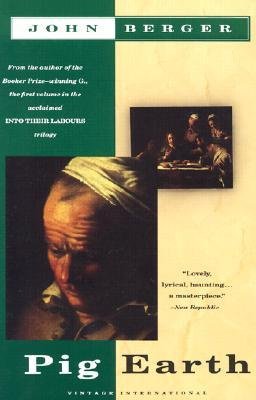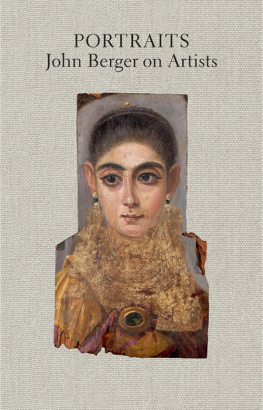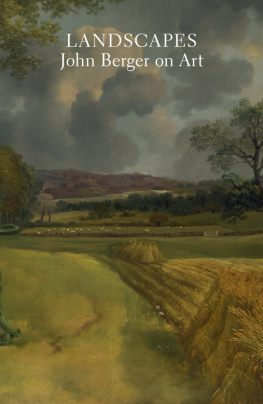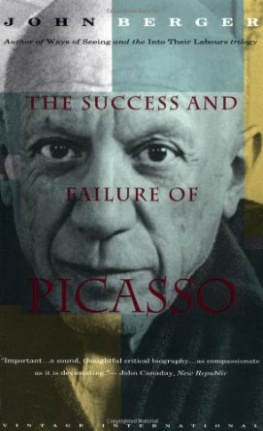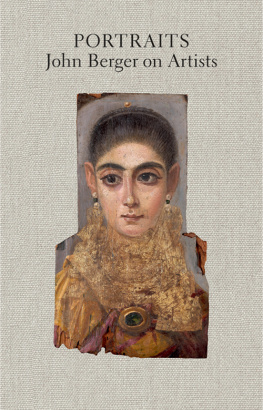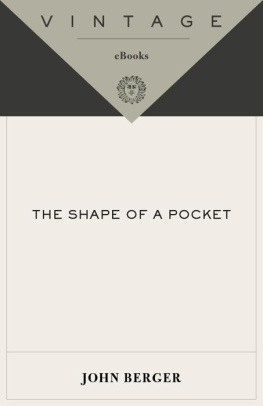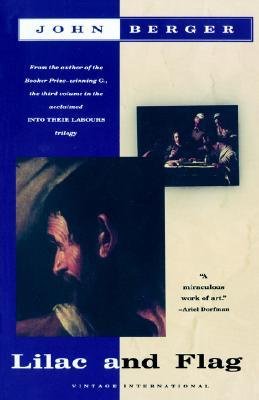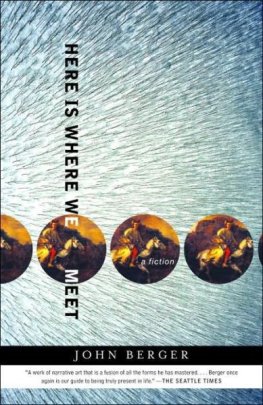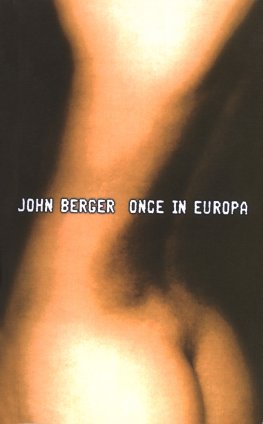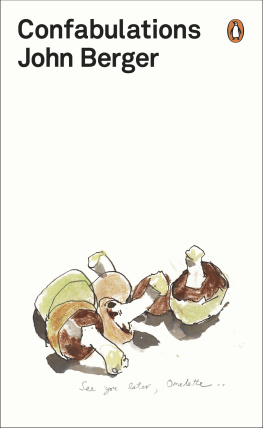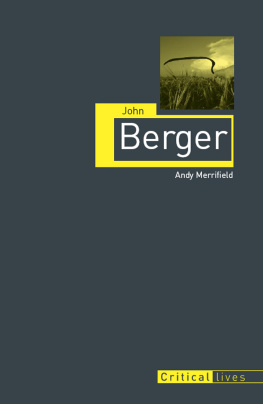John Berger was born in London in 1926. He is well known for his novels and stories as well as for his works of nonfiction, including several volumes of art criticism. His first novel, A Painter of Our Time, was published in 1958, and since then his books have included the novel G., which won the Booker Prize in 1972.
With Lilac and Flag (1990), Berger completed his peasant trilogy Into Their Labours, which also includes Pig Earth (1979) and Once in Europa (1987). His volumes of essays include Keeping a Rendezvous (1991), The Sense of Sight (1985), Ways of Seeing (1972), and Selected Essays (2001).
In 1962 Berger left Britain permanently, and he now lives in a small village in the French Alps.
Others have laboured and ye are entered
into their labours.
ST JOHN 438
This book is dedicated to five friends who have taught us:
Thophile Jorat
Angeline Coudurier
Andr Coudurier
Thophile Gay
Marie Raymond
to the friends who have helped us learn:
Raymond Berthier, Luc and Marie-
Threse Bertrand, Gervais and Mlina
Besson, Jean-Paul Besson, Denis Besson,
Michel Besson, Grard Besson, Christian
Besson, Marius Chavanne, Roger and
Noelle Coudurier, Michel Coudurier, La
Doxie, Rgis Duret, Gaston Forrestier,
Marguerite Gay, Noel and Hlne Gay,
Marcelle Gay, Jeanne Jorat, Armand
Jorat, Daniel and Yvette Jorat, Norbert
Jorat, Maurice and Claire Jorat, Franois
and Germaine Malgrand, Francis and
Joelle Malgrand. Marcel Nicoud, Andr
Perret, Yves and Babette Peter,
Jean-Marie and Josephine Pittet, Roger
and Rolande Pittet, Bernadette Pittet,
Franois Ramel, Francois and Lonie
Raymond, Basil Raymond, Guy and
Anne-Marie Roux, Le Violon, Walter
and to Beverly with whom I learn.
The earth shows up those of value and those who are good for nothing. A peasant judgement quoted by Jean Pierre Vernant in Mythe et Pense Chez les Grecs. (Vol. 2. Paris 1971)
The peasantry consists of small agricultural producers who with the help of simple equipment and the labour of their families produce mainly for their own consumption and for the fulfillment of obligations to the holders of political and economic power. Theodor Shanin. Peasants and Peasant Societies. (London 1976)
PEASANT LIFE is a life committed completely to survival. Perhaps this is the only characteristic fully shared by peasants everywhere. Their implements, their crops, their earth, their masters may be different, but whether they labour within a capitalist society, a feudal one or others which cannot be so easily defined, whether they grow rice in Java, wheat in Scandinavia or maize in South America, whatever the differences of climate, religion and social history, the peasantry everywhere can be defined as a class of survivors. For a century and a half now the tenacious ability of peasants to survive has confounded administrators and theorists. Today it can still be said that the majority in the world are peasants. Yet this fact masks a more significant one. For the first time ever it is possible that the class of survivors may not survive. Within a century there may be no more peasants. In Western Europe, if the plans work out as the economic planners have foreseen, there will be no more peasants within twenty-five years.
Until recently, the peasant economy was always an economy within an economy. This is what has enabled it to survive global transformations of the larger economy feudal, capitalist, even socialist. With these transformations the peasants mode of struggle for survival often altered but the decisive changes were wrought in the methods used for extracting a surplus from him: compulsory labour services, tithes, rents, taxes, sharecropping, interests on loans, production norms, etc.
Unlike any other working and exploited class, the peasantry has always supported itself and this made it, to some degree, a class apart. In so far as it produced the necessary surplus, it was integrated into the historical economic-cultural system. In so far as it supported itself, it was on the frontier of that system. And I think one can say this, even where and when peasants make up the majority of the population.
If one thinks of the hierarchical structure of feudal or Asian societies as being roughly pyramidal, the peasantry were on the base frontier of the triangle. This meant, as with all frontier populations, that the political and social system offered them the minimum of protection. For this they had to look to themselves within the village community and the extended family. They maintained or developed their own unwritten laws and codes of behaviour, their own rituals and beliefs, their own orally transmitted body of wisdom and knowledge, their own medicine, their own techniques and sometimes their own language. It would be wrong to suppose that all this constituted an independent culture, unaffected by the dominant one and by its economic, social or technical developments. Peasant life did not stay exactly the same throughout the centuries, but the priorities and values of peasants (their strategy for survival) were embedded in a tradition which outlasted any tradition in the rest of society. The undeclared relation of this peasant tradition, at any given moment, to the dominant class culture was often heretical and subversive. Dont run away from anything, says the Russian peasant proverb, but dont do anything. The peasants universal reputation for cunning is a recognition of this secretive and subversive tendency.
No class has been or is more economically conscious than the peasantry. Economics consciously determines or influences every ordinary decision which a peasant takes. But his economics are not those of the merchant, nor those of bourgeois or Marxist political economy. The man who wrote with most understanding about lived peasant economics was the Russian agronomist Chayanov. Anyone who wishes to understand the peasant should, among other things, go back to Chayanov.
The peasant did not conceive of what was extracted from him as a surplus. One might argue that the politically unconscious proletarian is equally unaware of the surplus value he creates for his employer, yet the comparison is misleading for the worker, working for wages in a money economy, can be easily deceived about the value of what he produces, whereas the peasants economic relation to the rest of society was always transparent. His family produced or tried to produce what they needed to live on, and he saw part of this produce, the result of his familys labour, being appropriated by those who had not laboured. The peasant was perfectly aware of what was being extracted from him, yet he did not think of this as a surplus for two reasons, the first material and the second epistemological. 1) It was not a surplus because his family needs had not already been assured. 2) A surplus is an end product, the result of a long-completed process of working and of meeting requirements. To the peasant, however, his enforced social obligations assumed the form of a preliminary obstacle. The obstacle was often insurmountable. But it was on the other side of it that the other half of the peasant economy operated, whereby his family worked the land to assure its own needs.
A peasant might think of his imposed obligations as a natural duty, or as some inevitable injustice, but in either case they were something which had to be endured before the struggle for survival opened. He had first to work for his masters, later for himself. Even if he were sharecropping, the masters share came

